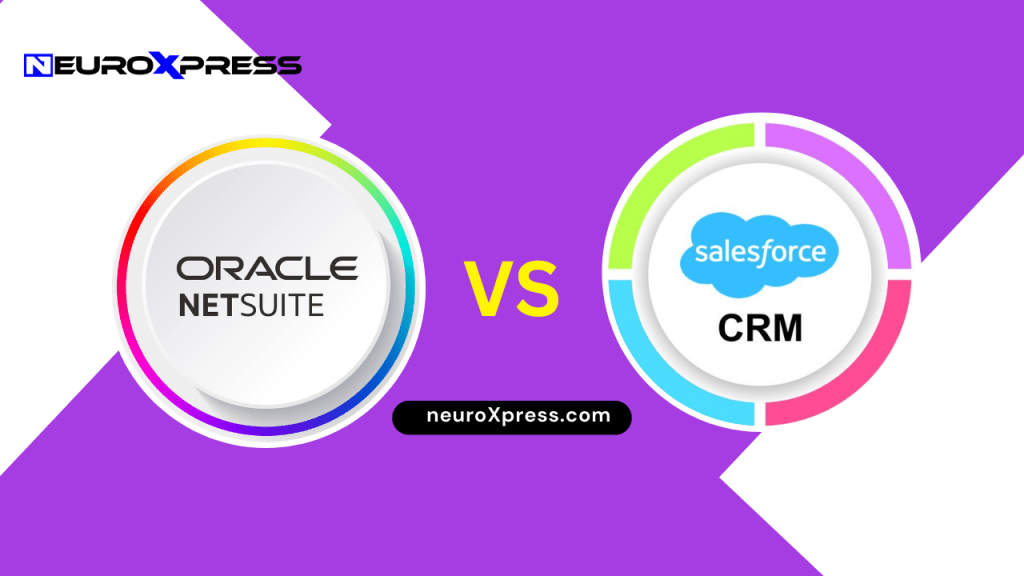Oracle NetSuite CRM vs Salesforce CRM: Which One is Better?
Okay, this time we will discuss Oracle NetSuite CRM vs Salesforce CRM. Choosing a CRM system is like choosing the heart of your customer interactions—you want something that’s powerful, adaptable, and helps you build lasting relationships. Oracle NetSuite CRM and Salesforce CRM are two titans in the field, each promising to transform your sales and customer service. But how do you decide which one is the right fit for your business? Let’s break it down and find your champion.
Imagine you’re aiming to create seamless customer experiences and drive sales growth. Sounds familiar? You need a CRM system that can handle everything from lead management to customer support, and you want it to integrate smoothly with your existing systems. That’s where NetSuite and Salesforce come into the spotlight.
Think of it this way: They’re like two different coaches, each with their own strategies and strengths. And here’s the thing: We’re not just comparing features on a checklist. We’re looking at how these systems can truly impact your customer relationships and help you achieve your business goals. But let’s be real: Every business has its own unique needs. So, let’s dig into the details and find the right fit for you.
Overview of Oracle NetSuite CRM
Oracle NetSuite CRM is part of the larger NetSuite ERP suite, providing a comprehensive solution that integrates CRM functionalities with financial and operational management. This integration allows businesses to have a unified view of their customer interactions and back-office operations.
Key Features of Oracle NetSuite CRM
- 360-Degree Customer View: Offers a complete view of customer interactions, including sales history, support tickets, and marketing campaigns.
- Sales Force Automation: Automates sales processes, from lead generation to order fulfillment, improving efficiency and accuracy.
- Advanced Analytics: Provides real-time reporting and analytics to help businesses make data-driven decisions.
- Customization Options: Highly customizable to fit specific business needs and workflows.
- Integration with ERP: Seamlessly integrates with NetSuite’s ERP functionalities, allowing for better financial and operational management.
Overview of Salesforce CRM
Salesforce CRM is a cloud-based platform that has become synonymous with customer relationship management. Known for its robust features and user-friendly interface, Salesforce offers a wide range of tools designed to enhance sales, marketing, and customer service.
Key Features of Salesforce CRM
- Lead and Opportunity Management: Helps businesses track leads and opportunities throughout the sales cycle.
- Marketing Automation: Offers tools for email marketing, campaign management, and customer segmentation.
- Customer Service Solutions: Provides case management, service analytics, and a self-service portal for customers.
- AppExchange Marketplace: Access to thousands of third-party applications to extend the platform’s functionality.
- AI-Powered Insights: Utilizes Salesforce Einstein to provide predictive analytics and insights for better decision-making.
Comparison of Features
| Feature | Oracle NetSuite CRM | Salesforce CRM |
|---|---|---|
| 360-Degree Customer View | Yes | Yes |
| Sales Automation | Yes | Yes |
| Marketing Automation | Limited | Extensive |
| Customer Service Tools | Yes | Yes |
| Customization | High | Very High |
| Integration with ERP | Seamless with NetSuite ERP | Limited (requires additional integration) |
| AI Capabilities | Basic | Advanced (Salesforce Einstein) |
Pricing Comparison
- Oracle NetSuite CRM: Pricing is typically based on a subscription model, starting around $999/month for basic features, with additional costs for advanced functionalities and user licenses.
- Salesforce CRM: Pricing starts at $25/user/month for the Essentials plan, with more advanced plans (Professional, Enterprise, and Unlimited) ranging from $75 to $300/user/month depending on the features included.
Pros and Cons
Pros and Cons Table Oracle NetSuite CRM vs Salesforce CRM
| Criteria | Oracle NetSuite CRM | Salesforce CRM |
|---|---|---|
| Pros | – Integrated with ERP for a complete view | – Extensive customization options |
| – Strong financial management capabilities | – Robust marketing automation tools | |
| – Real-time analytics and reporting | – Large ecosystem of third-party apps | |
| Cons | – Higher starting price | – Can become expensive with add-ons |
| – Limited marketing automation features | – Implementation can be complex |
Summary Diagram
| Criteria | Oracle NetSuite CRM | Salesforce CRM |
|---|---|---|
| Ease of Use |
7/10 |
9/10 |
| Customization |
8/10 |
9/10 |
| Integration |
9/10 |
7/10 |
| Marketing Automation |
6/10 |
9/10 |
| Overall Value |
8/10 |
9/10 |
Conclusion of Oracle NetSuite CRM vs Salesforce CRM
When comparing Oracle NetSuite CRM and Salesforce CRM, the choice ultimately depends on your business’s specific needs and budget.
- Oracle NetSuite CRM is an excellent choice for businesses looking for a comprehensive solution that integrates CRM with ERP functionalities. Its strong financial management capabilities and real-time analytics make it suitable for organizations that require a unified view of their operations.
- Salesforce CRM, on the other hand, is ideal for businesses that prioritize marketing automation and customer engagement. Its extensive customization options and robust ecosystem of third-party applications provide flexibility and scalability for growing organizations.
In summary, both solutions have their strengths and weaknesses. Evaluating your business requirements, budget, and growth plans will help you make the best decision for your organization.
